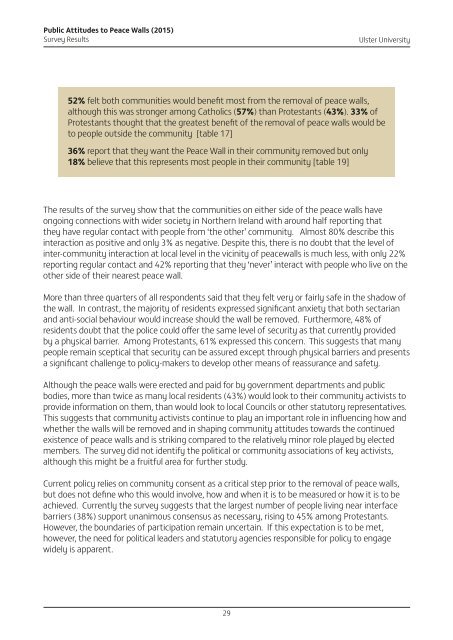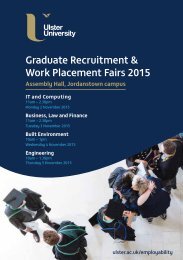Public Attitudes to Peace Walls (2015)
1RRkqqy
1RRkqqy
You also want an ePaper? Increase the reach of your titles
YUMPU automatically turns print PDFs into web optimized ePapers that Google loves.
<strong>Public</strong> <strong>Attitudes</strong> <strong>to</strong> <strong>Peace</strong> <strong>Walls</strong> (<strong>2015</strong>)<br />
Survey Results<br />
Ulster University<br />
52% felt both communities would benefit most from the removal of peace walls,<br />
although this was stronger among Catholics (57%) than Protestants (43%). 33% of<br />
Protestants thought that the greatest benefit of the removal of peace walls would be<br />
<strong>to</strong> people outside the community [table 17]<br />
36% report that they want the <strong>Peace</strong> Wall in their community removed but only<br />
18% believe that this represents most people in their community [table 19]<br />
The results of the survey show that the communities on either side of the peace walls have<br />
ongoing connections with wider society in Northern Ireland with around half reporting that<br />
they have regular contact with people from ‘the other’ community. Almost 80% describe this<br />
interaction as positive and only 3% as negative. Despite this, there is no doubt that the level of<br />
inter-community interaction at local level in the vicinity of peacewalls is much less, with only 22%<br />
reporting regular contact and 42% reporting that they ‘never’ interact with people who live on the<br />
other side of their nearest peace wall.<br />
More than three quarters of all respondents said that they felt very or fairly safe in the shadow of<br />
the wall. In contrast, the majority of residents expressed significant anxiety that both sectarian<br />
and anti-social behaviour would increase should the wall be removed. Furthermore, 48% of<br />
residents doubt that the police could offer the same level of security as that currently provided<br />
by a physical barrier. Among Protestants, 61% expressed this concern. This suggests that many<br />
people remain sceptical that security can be assured except through physical barriers and presents<br />
a significant challenge <strong>to</strong> policy-makers <strong>to</strong> develop other means of reassurance and safety.<br />
Although the peace walls were erected and paid for by government departments and public<br />
bodies, more than twice as many local residents (43%) would look <strong>to</strong> their community activists <strong>to</strong><br />
provide information on them, than would look <strong>to</strong> local Councils or other statu<strong>to</strong>ry representatives.<br />
This suggests that community activists continue <strong>to</strong> play an important role in influencing how and<br />
whether the walls will be removed and in shaping community attitudes <strong>to</strong>wards the continued<br />
existence of peace walls and is striking compared <strong>to</strong> the relatively minor role played by elected<br />
members. The survey did not identify the political or community associations of key activists,<br />
although this might be a fruitful area for further study.<br />
Current policy relies on community consent as a critical step prior <strong>to</strong> the removal of peace walls,<br />
but does not define who this would involve, how and when it is <strong>to</strong> be measured or how it is <strong>to</strong> be<br />
achieved. Currently the survey suggests that the largest number of people living near interface<br />
barriers (38%) support unanimous consensus as necessary, rising <strong>to</strong> 45% among Protestants.<br />
However, the boundaries of participation remain uncertain. If this expectation is <strong>to</strong> be met,<br />
however, the need for political leaders and statu<strong>to</strong>ry agencies responsible for policy <strong>to</strong> engage<br />
widely is apparent.<br />
29




